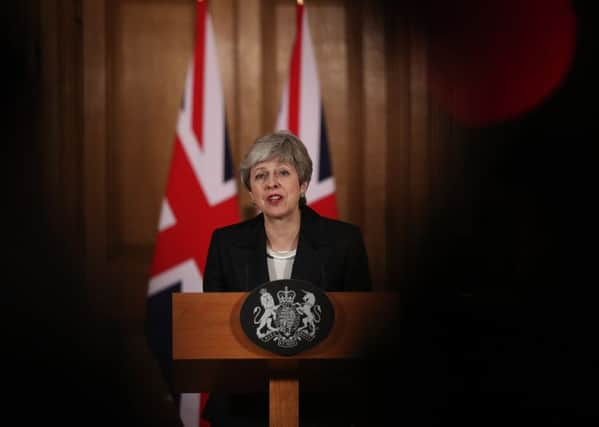Bill Carmichael: Why the Brexit crisis will deepen if Theresa May quits and MPs reject her deal


Outside the Palace in Parliament Square, there are dozens of passionate pro and anti-Brexit campaigners with their colourful banners and flags and even more colourful language. Don’t they have jobs to go to? Obviously not. They are apparently there all day, every day.
I paused for a few moments to listen to the heated debates taking place on the pavement and silently gave thanks that we live in a country where such discussions can take place without anyone being dragged off to the gulag.
Advertisement
Hide AdAdvertisement
Hide AdOne thing you can say about Brexit is that is has energised our democracy. Yes, of course people are sick of the whole thing, but not so long ago we were complaining about political apathy – not any more!
Inside Parliament the atmosphere is no less fraught with the more candid MPs openly admitting they haven’t a clue what will happen next and experienced journalists trying to make sense of it all – without much success.
Advertisement
Hide AdAdvertisement
Hide AdIt really is a remarkable situation – nobody, not even the most powerful people in the country, can state with any certainty who will be Prime Minister in a week’s time and whether we will remain as members of the European Union.
To give you a taste of how jittery everyone is, late on Wednesday afternoon rumours began to circulate that the Prime Minister was to make a statement from Number 10 Downing Street later that evening.
This was unscheduled and unexpected and there was immediate speculation that she was going to resign or call a General Election – neither of which turned out to be the case. Political reporters, some already on the way home, were immediately scrambled to return.
The more excitable predictions of what Theresa May was to announce in that speech proved to be wrong and there was a strong sense of anti-climax, but the Prime Minister did reveal an interesting new tactic.
Advertisement
Hide AdAdvertisement
Hide AdShe basically blamed MPs for the Brexit impasse and reached over their heads to the ordinary voters, saying they were tired of the infighting, political games and “arcane procedural rows”.
She added: “You want this stage of the Brexit process over and done with. I agree. I am on your side.”
And she went on to tell MPs that they must decide between her deal, a “no-deal” or no Brexit at all – although she warned that the latter option would cause “irreparable damage to public trust” in politicians.
Her analysis is spot-on, I think, but the trouble is she is not in control of the process. She is clearly hoping that fed-up members of the public will badger their MPs to back the deal, but is that going to be enough to garner sufficient support for her to win “meaningful vote 3” in the Commons?
Advertisement
Hide AdAdvertisement
Hide AdNot only is she is reliant on MPs to back her deal, but she is also now dependent on the other 27 EU countries agreeing to comply with her request for a three-month delay in the UK leaving.
Given the volatility of our politics, only a mug would make a prediction – so fully in the knowledge that I am likely to make a fool of myself, here’s my tuppence worth.
I think MPs, faced with a choice of Mrs May’s deal or “no deal”, will eventually back the Prime Minister and we’ll leave the EU on the terms she has negotiated.
If, however, she loses “meaningful vote 3”, I expect her to resign and, although it is hard to imagine, the chaos we are experiencing now will get even worse.
Advertisement
Hide AdAdvertisement
Hide AdBack in the 1930s, with Germany resurgent and Europe heading for another catastrophic world war, former Foreign Secretary Sir Austen Chamberlain quoted what he said was an ancient Chinese curse: “May you live in interesting times.”
He added: “We move from one crisis to another. We suffer one disturbance and shock after another.”
I don’t think anyone would compare today’s squabbling with the dark days of the 1930s – but we certainly live in interesting times and the chances are they may get more interesting still.